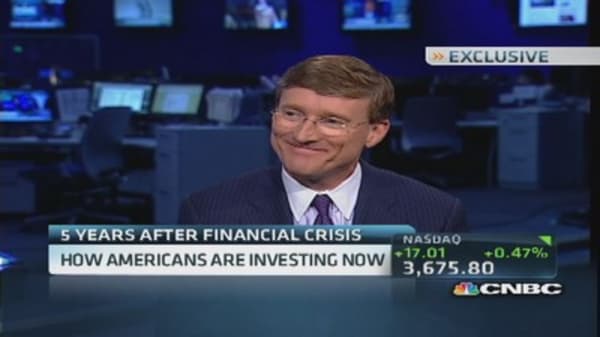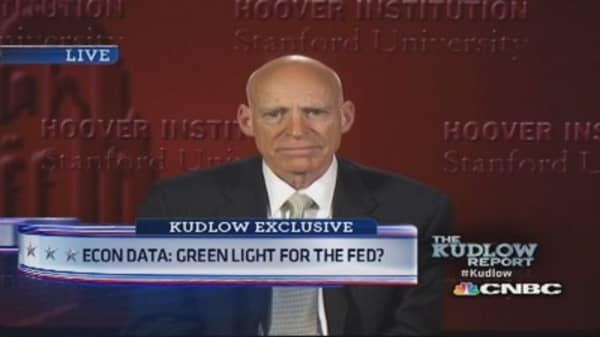Springer's latter point highlights the real rub of this market and the post-crisis dynamic: While stocks have soared, the retail crowd has been decidedly underinvested and is just now coming off the sidelines.
Since 2000, fixed income has taken in nearly $1 trillion, while equities have lost nearly $400 billion. That tide has turned this year but the main question now is whether it's too late. After all, the nature of the market is that most investors buy high and sell low, entering at peaks and exiting in valleys.
"It's almost inherent to the culture: You follow crowds. You do that in most things in life, chasing fads," said Jim Paulsen, chief market strategist at Wells Capital Management in Minneapolis, which represents the other end of the business in the $317 billion it manages.
(Read more: The 5% recovery: Why most are still in recession)
"You do that in the stock market, but I think we're a long ways from that. This is not a fad by any stretch of the imagination."
Paulsen himself has stayed solidly bullish on the market even through its downturns, but has had a rough time convincing clients to feel the same.
"The biggest quandary for most people is they find themselves underweight equities and overweight cash and even fixed income, and they're wondering what to do," he said. "But they can't really bring themselves to move just because equities are up."
Market skepticism essentially has three roots: Worry that another crash could come along without notice, much as the subprime crisis emerged; that high-frequency traders are controlling the market with their computers; and whether the Federal Reserve is manipulating the markets through its monthly money-printing.
The Fed's involvement is a double-edged sword, with the central bank indeed forcing investors into risky assets and boosting prices, while simultaneously instilling fear that the gains won't last.
(Read more: Investors don't know what to do about rising rates)
"They do feel like the market's gone up, but they feel it's rigged," Kathy Boyle, president of Chapin Hill Advisors, a New York-based boutique investment advisory, said of her clients. "They just laugh. They feel this market has been propped up and it's not real."
With a balance sheet bloated past $3.6 trillion, the central bank's easy-money policies could, as they often have, lead to an asset bubble, explosive inflation and an eventual cascade in the financial markets.
"They'll come back—if we don't have another crash, and the Fed is right," Springer said. "This is probably creating a bigger problem down the road, but the reality is we don't know. If by some chance they're right, it will be like curing the common cold."
What Paulsen and others in his business are counting on is that pervasive investor caution is paving the way toward an even stronger bull market.
Liz Ann Sonders, chief investment strategist at Charles Schwab, which manages $2.12 trillion for clients, recalled a particularly nasty response she got after posting a market note on the firm's website recently.
In no uncertain terms, the client made it clear that he or she still considered Wall Street, as well as "the Congress they bought," corrupt to the core.
(Read more: Keep printing? Fed stays in game, but exit looms)
"I don't see how that situation has improved at all. If anything it has gotten worse," Sonders said. "The muscle memory is still absolutely there about that."
In a contrarian way, though, she thinks the slow trudge back is exactly what will buoy returns for those who have stayed the course.
"I remain quite optimistic because I think nary a brick has been knocked out of the long-term wall of worry," Sonders said. "You don't really have any enthusiastic cohort. To me that breeds longer-term opportunity. We haven't captured the hearts and minds of investors yet."
—By CNBC's Jeff Cox. Follow him @JeffCoxCNBCcom on Twitter.






